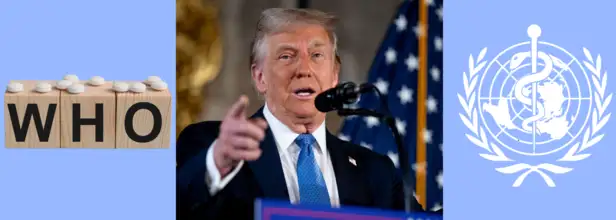- Health Conditions A-Z
- Health & Wellness
- Nutrition
- Fitness
- Health News
- Ayurveda
- Videos
- Medicine A-Z
- Parenting
'We Hope US Will Reconsider' Says WHO On Trump's Exit Order From Global Health Body

Soon after the inauguration of Donald Trump as the 47th President of the United States, the country withdrew from the global health body the World Health Organization (WHO). As per the Executive Order of the White House, the "United States noticed its withdrawal from the World Health Organization (WHO) in 2020 due to organization's mishandling of the COVID-19 pandemic that arouse out of Wuhan, China, and other global health crises, its failure to adopt urgently need reforms, and its inability to demonstrate independence from the inappropriate political influence of WHO member states."
This decision, may not be the correct one for Making America Healthy Again, a counterpart of the MAGA brand of Make America Great Again. As per Dr Ashish Jha, dean of the school of public health at Brown University and former White House COVID-19 Response Coordinator, "For Americans it may not be obvious immediately what the impact will be but given the world we live in and all of the factors that are driving more disease outbreaks, America cannot fight them alone." He also said that an effective WHO is not only important to keep the world safe from diseases, but "to keep Americans safe from these diseases".
What Does It Mean To Public Health?
The US is a major sponsor of the WHO, its withdrawal means cutting off funding for aiding public health programs in developing countries.
William Schaffner, MD, professor of preventive medicine and infectious diseases at Vanderbilt University Medical Center in Nashville told a medical-media reporting outlet, "Viruses don’t require passports to move around the world. Our capacity to gather information and apply that information for the protection of our own population is, in part, dependent on our relationships with other countries, and that works most smoothly with the World Health Organization."
WHO is also responsible for other public health programs, especially vaccines. Each year, scientists from around the world work with health officials and determine which influenza and COVID-19 strains to include in updated versions of these shots. US, for as long as it was the member, had access to samples of these strains, which helped in vaccine development. Thus, being part of this network is critical, especially when new viruses or strain emerges.
Also Read: Kolkata-Born Jay Bhattacharya Key Candidate For US Health Agency NIH Director
The WHO also provides guidance and advices on breastfeeding, diabetes, giving up smoking, and many more, which applies across countries. While there are other non-government organizations and philanthropies that exist, no one has the trust relationships with the ministries of health in different countries as WHO.
As per Jha, at this moment around 30,000 elderly people are at high risk of influenza complications deaths annually from the flu. US' withdrawal from WHO means inaccessibility from the database and inability to make an effective vaccine. US would also lose access of a global database of health information which includes surveillance for new and existing infectious disease. Experts believe, this could make the country more vulnerable to microbial threats from around the world.
Since WHO initiates health programs, including awareness and eradication of diseases in various countries. with US withdrawing from the global health body, this will be filled in by other powerful countries, which will make the connections to countries which had been valuable to the US for over the decades. In a way, it could also hurt the public health diplomacy.
The world is also afraid that without the US membership, WHO would lose its close ties with the Centers for Disease Control and Prevention (CDC), which is regarded as one of the world's leading public-health agencies, this would recalled many CDC researchers assigned to the WHO. Will this impact the existing health agencies in the US? This is a concern experts have expressed in the past with the nomination of RFK Jr. to head the US health department, who had openly discouraged vaccines.
Read More: Robert F. Kennedy Jr.’s 8 Most Controversial Health Declarations As Potential US Health Secretary
What The WHO Says?
The WHO said that it regretted the decision from its top donor country and also urged for a reconsideration. It wrote on X, formerly Twitter:
"The World Health Organization regrets the announcement that the United States of America intends to withdraw from the Organization…We hope the United States will reconsider and we look forward to engaging in constructive dialogue to maintain the partnership between the USA and WHO, for the benefit of the health and well-being of millions of people around the globe."
Read What Trump Said At His Inauguration.
Norovirus Infects More Than 100 Cruise Passengers On Board, Details Inside

Credits: AIDA.com and Canva
Norovirus Outbreak: In a globe-hopping cruise ship, more than 100 guests and crew reported being sick with norovirus outbreak. As per the Centers for Disease Control and Prevention (CDC), the 21st outbreak of gastrointestinal disease on a cruise ship monitored by the agency this year.
AIDA Cruises alerted the CDC to the outbreak aboard the AIDAdiva on November 30, confirmed the agency. So far, the outbreak has impacted 95 passengers out of the 2,007 onboard, and 6 out of 640 staff members, noted CDC.
The passengers also suffered symptoms like diarrhea and vomiting on voyage, which had begun on November 10 and is slated to last through December 16. The cruise line responded by stepping up cleaning and disinfection efforts, separating sick passengers and crew from others, working closely with the CDC’s Vessel Sanitation Program, and collecting stool samples for testing, the agency said.
What Are The Cruise Officials Doing About The Ship Outbreak?
“Seasonal illness peaks between November and April, and the AIDAdiva report mirrors what we’re seeing on land,” AIDA told People. “We’ve increased hygiene measures onboard, and cases are already declining.”
The Independent reports that AIDAdiva is currently midway through its 133-day voyage from Hamburg, Germany, with planned stops across North America. According to CruiseMapper, the ship is now in Costa Rica.
This outbreak is the 21st recorded this year on a CDC-regulated cruise ship, most of them caused by norovirus. That’s higher than the recent yearly totals: 18 outbreaks in 2024 and 14 in 2023. While cruises are often linked with norovirus, only a small share of overall cases actually occur at sea. In most years, ship outbreaks simply mirror seasonal spikes happening on land.
Officials say it’s too soon to say why numbers are up.
“Although cruise ship outbreaks have been higher than in pre-pandemic years, we don’t yet know if this is a lasting trend,” the CDC told USA TODAY in April. They added that a newly dominant norovirus strain is driving many land-based outbreaks this season, and ships usually follow the same pattern.
Norovirus is the leading cause of vomiting, diarrhea, and foodborne illness in the U.S. It triggers acute gastroenteritis, an inflammation of the stomach or intestines. Most people recover within one to three days, but they can remain contagious even after symptoms improve.
The virus spreads easily through contaminated food, surfaces, or close contact. Regular handwashing, proper cooking and cleaning of produce and shellfish, and routine disinfection of surfaces are key steps to prevent infection.
What Is Norovirus?
Often called the “stomach flu” or “stomach bug,” norovirus is not related to influenza. It causes acute gastroenteritis, an inflammation of the stomach and intestines. Most people recover within 1 to 3 days, but the virus can still be contagious for several days afterward. In 2025 alone, the CDC has recorded 19 gastrointestinal outbreaks on cruise ships, 14 of which were caused by norovirus. The CDC notes that such illnesses spread quickly in enclosed environments like cruise ships.
Unique Symptoms Observed on This Cruise
Norovirus symptoms usually appear 12 to 48 hours after exposure. While diarrhea, vomiting, nausea, and stomach cramps remain common, this outbreak has shown some unusual signs:
- Dehydration
- Reduced urination
- Dry mouth and throat
- Feeling dizzy when standing
- Crying with few or no tears
- Unusual sleepiness or irritability
Oral Weight Loss Pill Comes Next Year, Says Eli Lily As It Announces A Third Manufacturing Facility In US

Credits: Canva
Eli Lily's CEO David Ricks announced a new US factory worth over $6 Billion as per several reports that will manufacture the awaited weight loss pill: Orforglipron. The company had earlier announced that the weight loss pill had successfully met the “primary and all key secondary endpoints” in a large clinical trial, paving the way for global regulatory submissions.
“With these positive data in hand, we are moving with urgency toward global regulatory submissions to potentially meet the needs of patients who are waiting,” said Kenneth Custer, Eli Lilly’s executive vice president and president of cardiometabolic health.
“If approved, we are ready to offer a convenient, once-daily pill that can be scaled globally, removing barriers and redefining how obesity is treated around the world.”
This comes after President Donald Trump on its website TrumpRx allowed Americans to purchase prescription medication from pharmaceutical companies at discounted rates, among them also include GLP-1 medications. The Trump administration also unveiled agreements with Eli Lily to make these drugs more affordable. Trump has taken a special interest in the 'fat drug'.
In an exclusive interview with CNN's Erin Burnett, CEO Ricks shared that this new weight loss pill will be coming out next year. Eli Lily is also the company that has made Zepbound. Talking about the side effects of weight loss drugs, which included weight loss drugs reducing age, or people reporting pancreas problems, or the drugs changing brain's make up to curb down cravings, the CEO said that these were just a selected few people reporting such results. He said that he has received emails, photos from before and after of people who have been on weight loss drugs and how they are with their transition. "There were people who were changing not just the way they look, but also their health status in this country and around the world. So most of the evidence is from the opposite side," he said.
In terms of life expectancy, he said that "most of the data that we have collected it [weight loss drugs] extends life". How? "They do it through preventing diabetes, preventing heart attacks, and preventing other serious anomalies that comes through obesity," said the CEO.
What Is Orforglipron?
Originally discovered by Japan’s Chugai Pharmaceutical and later licensed to Eli Lilly in 2018, orforglipron is now in Phase 3 trials. The company is testing it not just for weight management and type 2 diabetes but also for conditions linked to obesity, including obstructive sleep apnea and hypertension.
Why An Oral Option Matters
Injectable GLP-1 receptor agonists like semaglutide and tirzepatide have already transformed obesity and diabetes care, but accessibility remains a hurdle. For many patients, injections are intimidating, inconvenient, or simply not practical in daily life.
That’s where an oral pill could be a game-changer. A once-daily tablet could remove psychological and logistical barriers, making it easier for patients to stay on treatment. And given the rising global burden of obesity, which significantly raises the risk of cardiovascular disease, stroke, and some cancers, the demand for more convenient treatment options has never been greater.
Pills vs. Injections: Which Works Better?
The big question now is whether oral GLP-1 drugs are as effective as their injectable counterparts.
A 2021 research review published in Springer Nature, offers some clues. After examining multiple studies, researchers concluded that oral semaglutide, a similar class of drug, provided “similar or better efficacy and similar tolerability” compared to injectable GLP-1 receptor agonists.
Also Read: How To Identify A Counterfeit Ozempic? Look For These Signs
In some cases, oral versions were found to be just as effective for weight loss and lowering A1C levels in people with type 2 diabetes. However, the review focused on patients already using insulin, which may have influenced outcomes. Experts emphasize that while results are encouraging, more research is still needed to directly compare oral and injectable versions in broader populations.
Sperm Donor With Cancer Causing Gene Fathered Almost 200 Children Across Europe

Credits: Canva
An unknowing harboring of genetic mutation that raised the risk of cancer by a sperm donor who fathered at least 197 children across Europe. BBC reported on a major investigation that revealed that some children have already died and only "a minority who inherit the mutation will escape cancer in their lifetimes".
According to BBC, the sperm was not sold to UK clinics, in fact, a "very small" number of British family used the sperm while they had their fertility treatment in Denmark. It was the European Sperm Bank of Denmark that admitted that the sperm was used to make too many babies in some countries and that they had their "deepest sympathy" for the families affected.
What Was The Investigation All About?
The investigation was conducted by 14 public broadcasters, which included BBC, as part of the European Broadcasting Union's Investigative Journalism Network.
This is what the investigation revealed: This sperm donor, who was perfectly healthy on paper started donated sperm as a young student in 2005. He was paid for each donation. He passed all the routine screening tests and showed no signs of illness. For nearly 17 years, women across Europe used his sperm to have children.
But there was something inside his DNA that no one could have detected at the time.
Before the donor himself was born, a random change occurred in some of the cells that were forming his body. This mutation damaged a crucial gene called TP53. This gene acts like the body’s security guard. Its job is to spot dangerous changes in cells and stop them from turning cancerous.
Most of the donor’s body does not carry this mutation, which is why he has never become ill. However, his sperm cells are a different story. Up to 20% of them carry the faulty TP53 gene.
This created a devastating possibility. If a sperm carrying the mutation fertilizes an egg, the resulting child will have the mutation in every single cell of their body. That child is then born with Li Fraumeni syndrome, a condition that brings an up to 90 percent lifetime risk of cancer. These cancers often appear in childhood and include leukemia, bone cancers, brain tumors and breast cancer later in life.
The donor had no idea any of this was happening. Neither did the clinics using his sperm.
How Was This Mutation Discovered?
The alarm was first raised when doctors across Europe began seeing children with aggressive cancers whose genetic tests all pointed back to the same TP53 mutation. Eventually, they discovered that the children were conceived using sperm from the same donor.
By the time this was uncovered, the donor’s sperm had been used by 67 fertility clinics across 14 countries. At least 197 children are known to have been born using his donations, though the final number could be higher. It is not yet known how many of them inherited the dangerous gene.
Doctors say several of these children have already been diagnosed with cancer, some have developed more than one cancer, and some have died.
Dr Edwige Kasper, a cancer geneticist in France, has been helping families navigate the diagnosis.
“We have many children who have already developed cancer,” she said. “Some have had two cancers and some died very early.”
A Mother’s Discovery
One mother, whose name is changed to Céline (as per the BBC report), conceived her daughter with the donor’s sperm in Belgium. 14 years later, she received a call from the clinic urging her to get her child screened.
Her daughter tested positive for the mutation.
Céline says she does not blame the donor but is devastated that she was given sperm that “was not safe”. She knows cancer could strike at any point.
“We do not know when, we do not know which cancer, and we do not know how many times,” she said. “When it comes, we fight.”
How Regulation Failed
There is no global law limiting how many families a sperm donor can help. Each country sets its own rules.
In Belgium, for example, one donor should be used for no more than six families. This donor helped create 38 families in Belgium alone.
The UK limit is ten families, but the donor’s sperm was never sold directly to UK clinics. Instead, the Danish authorities informed the UK that a small number of British women travelled to Denmark for treatment using this donor’s sperm. Those women have since been contacted.
The European Sperm Bank admits national limits were breached in some countries and says the donor was immediately blocked once the mutation came to light. They say the donor and his relatives are healthy and that this type of mutation cannot be detected with standard screening.
Can Donor Screening Ever Catch Everything?
Experts say cases like this are extremely rare but nearly impossible to prevent entirely.
“You cannot screen for everything,” said Prof Allan Pacey from the University of Manchester. “If we make screening even tighter, we would not have any donors left.”
He added that countries have become too dependent on large international sperm banks, which supply multiple nations simultaneously.
Important Questions Parents Must Ask
Experts advise choosing licensed clinics and asking:
- Is the donor local or from another country?
- How many families has this donor helped?
- What screening has been done?
© 2024 Bennett, Coleman & Company Limited

